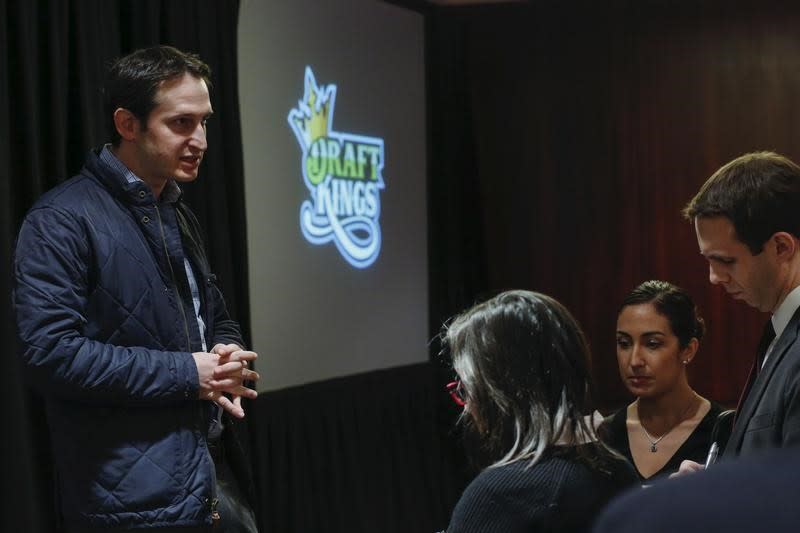The DraftKings-FanDuel mega-merger is in mega trouble

Last November, the two biggest players in the fast-growing daily fantasy sports business, DraftKings and FanDuel, announced their intention to combine into one company. They said at the time that they expected the deal to close in the second half of 2017.
Now, exactly seven months later, and halfway through 2017, the merger is in trouble.
[UPDATE, 7/13/17: DraftKings and FanDuel have called off their merger plan. Read on to see all the factors that led them to do it.]
On Monday, the Federal Trade Commission (FTC), along with the attorneys general of California and Washington, DC, took legal action to block the merger by requesting a temporary halt to the merger activities.
On Wednesday, a federal judge enforced a temporary restraining order, halting the merger.
The FTC’s argument: the proposed merger violates Section 7 of the Clayton Act and Section 5 of the FTC Act because the combined company would control “more than 90 percent of the US market for paid daily fantasy sports contests.” The FTC will seek a preliminary injunction to stop the deal.
To put that in layperson’s terms: the FTC believes the combined company would have a monopoly, and it’s suing to stop the merger. (And in fact, “more than 90%” may be conservative; other estimates have pegged the combined DraftKings and FanDuel share at more than 95%.)
“This merger would deprive customers of the substantial benefits of direct competition between DraftKings and FanDuel,” says Tad Lipsky, acting director of the FTC’s Bureau of Competition, in a press release. “The FTC is committed to the preservation of competitive markets.”
Indeed, DraftKings and FanDuel together enjoy an estimated 95% of the daily fantasy sports business. Other companies offer daily fantasy games (including Yahoo, which is much larger than either DraftKings or FanDuel) but have much smaller share in terms of user base.
Marc Edelman, a law professor at Baruch College in New York who has consulted for fantasy sports companies, predicted this trouble would come. When the companies announced their plan to merge, Edelman told Yahoo Finance the merger would likely rank high on the Herfindahl-Hirschman Index, which measures a company’s market concentration to identify a possible monopoly. “The combined share of the merging companies in their market is nearly 100%,” he said. “This is far above the level that the horizontal guidelines indicate is problematic.” Edelman compared it to Coca-Cola merging with PepsiCo (within the scope of the still-small daily fantasy sports market).
DraftKings and FanDuel have argued that the combined company wouldn’t be a monopoly because they clearly plan to operate within the much larger, broader fantasy sports market—a $15 billion business that includes giants like CBS, ESPN, and Yahoo. Their logic is that even though DraftKings and FanDuel are the biggest players in daily fantasy games, they are a small fish in the bigger pond of fantasy sports.
DraftKings and FanDuel have both, in the last year, added new features that look more like season-long fantasy sports, which they will likely use to bolster their argument. In addition, FanDuel, gearing up for the merge, has slowly started to implement features that make it look more like DraftKings, such as adding golf contests. (See below video interview with FanDuel CEO Nigel Eccles.)
So the case will largely hinge on the definition of the scope of the market that DraftKings and FanDuel would operate in after they merge.
Now that the FTC, California, and DC are indeed seeking to block the merger, Edelman tells Yahoo Finance, “I would be rather astonished if a court allows the merger to proceed. The smart legal move would be to walk away from the merger.”
Don’t expect that to happen just yet: the companies “will ask a federal court to issue an injunction against” the FTC’s action, according to an internal email sent to DraftKings employees.
This issue will go to trial in November, meaning it’s now unlikely that DraftKings and FanDuel will merge before the next NFL season, their biggest time of year for paid contest entries.
In a joint statement, Jason Robins (CEO of DraftKings and the man who will run the combined entity, if it is allowed to form) and Nigel Eccles (CEO of FanDuel) said, “We are disappointed by this decision and continue to believe that a merger is in the best interests of our players, our companies, our employees and the fantasy sports industry. We are considering all our options at this time.”
—
Daniel Roberts is the sports business writer at Yahoo Finance and has reported extensively on the daily fantasy sports industry. Follow him on Twitter at @readDanwrite. Sportsbook is our recurring sports business video series.
Read more:
Why the island of Malta is so important for DraftKings
The daily fantasy sports market has a demographic problem
The fantasy sports business has changed drastically in just 1 year
Here’s where every state now stands on daily fantasy sports legality
5 things to know about a potential DraftKings-FanDuel merger
